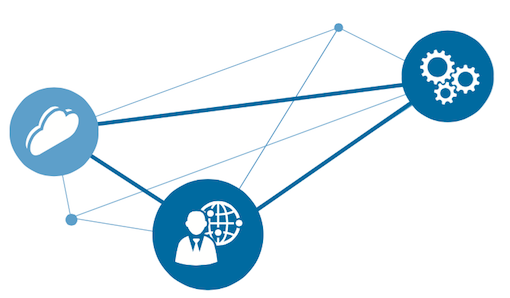
Read more of Prospect's "Data as infrastructure" report
Cities today are at a tipping point. Many are heavily congested and serviced by dated and deteriorating transport infrastructures that are struggling to keep pace with the growing demands of communities. Devolution and the digital transformation of the transport sector present a unique opportunity to improve connectivity on a local and regional scale.
Changes in customer needs are driving a paradigm shift across the industry, from planning to service delivery. These are enabled by advances in technology. And as industry and technology converge, it makes way for new innovations such as the development of Connected and Autonomous Vehicles and Mobility as a service.
This rapid evolution of transport services will certainly have an impact on urban mobility but only if regions are able to align existing challenges with the opportunities that exist. Not only will technology revolutionise the way we travel, it will also change the way we design and build future infrastructure as we harness innovation to meet current demands for an interconnected, high performing network.
Data is at the core of transport innovation
The successful transformation of this sector will rely on the effective use of data to inform future transport infrastructure and travel reliability. For cities to be able to make better use of pioneering mobility solutions, they must be able to capitalise on existing data. A recent report by the Transport Systems Catapult and the Open Data Institute shows that “investment in data could lead to faster journeys, lower emissions, improved regional connections and opportunities for job creation in an emerging technology sector—without the need for massive infrastructure building projects.”
The exploitation of Big and Open data in transport is currently being used to gain a deeper understanding of users’ needs and to monitor infrastructure and services. Big data is being applied in asset maintenance, road traffic management and the planning of public transport services. As well as unlocking opportunities for improved travel, it can further facilitate wider socio-economic benefits that boost regional growth and productivity. However, there are huge structural challenges around the collection and analysis of data. Getting around this requires robust frameworks that allow data to be shared and actioned appropriately. London is a good example of a city maximising open data sharing platforms to improve local services. A collaborative effort between the Greater London Authority and Transport for London have led to successful solutions such as Citymapper.
Mobility as a Service (MaaS)
Overall, research and development in the transport sector is accelerating and when compared to a decade ago we are certainly experiencing a rise in innovation efficiency. New concepts such as Mobility as a Service can bring transformative value to the UK’s transport network—allowing customers, through a single app and payment function, to design their desired journey, mode agnostic. The widespread use of smartphones and an expanding Internet of Things are not only driving behavioural change but also advances in data linkage.
This concept is designed to make travel effortless by integrating both public and private services.
Atkins recently conducted a MaaS trial in Cambridge, exploring commuters’ attitude to the application of a more integrated transport system with better planning for the first mile/ last mile solution. The Zume trial looked at Cambridge’s travel environment and what was required to build a solution that takes this structure into consideration. Participants were provided with an on-demand, multi-modal service for their daily commute to work, as an alternative to private travel. The outcome highlighted a growing need for transport services to be designed with a clear understanding of what mechanisms will change travel behaviour to increase the use of public transport.
The future of place
The idea of achieving a seamless end-to-end journey often seems impossible but there is potential for MaaS solutions to modernise local communities and regions through intelligent connectivity. Recently, there has been a renewed focus on place shaping and creating communities that work for all. For this to be effective, transport providers must rethink the priorities for future transport planning—developing strategies that service regions as conduits for modern mobility allowing end-users greater flexibility and convenience. Commuters are asking for a transport system with greater capacity, reduced congestion and journey times along with faster, more accurate on-demand information. They are asking for this efficient network to be built into a city with adequate housing and employment opportunities. Therefore, transport planning must take a holistic view of community needs.
Making the strategy work
As urban mobility is reshaped in the coming years, it must be done alongside rural transport development for cities and regions to work efficiently. This starts with implementing robust, well-defined strategies that makes opportunities for data solutions to be built into traditional infrastructure proposals. As cities look ahead—they must focus on full transport integration and how this is employed to build productive places.
On the 3rd of October, Prospect launched Data as Infrastructure. This special report grew out of a series of high-level roundtable meetings over the summer which brought together government, private businesses and the third sector to look at how data is already being used to improve people’s lives and how it has the potential to do so much more.
To find out more about how you can become involved in Prospect’s thought leadership programmes, please contact saskia.abdoh@prospect-magazine.co.uk.
You can also download the whole Data as Infrastructure supplement as a fully designed PDF document. To do so, simply enter your email below. You’ll receive your copy completely free—within minutes.
[prosform fields="email,forename,surname" signupcode="Data" countrycode="GB" redirect="data-as-infrastructure-is-yours"]
When you sign up for this free report, you will also join our free Prospect newsletter.
Prospect takes your privacy seriously. We promise never to rent or sell your e-mail address to any third party. You can unsubscribe from the Prospect newsletter at any time












